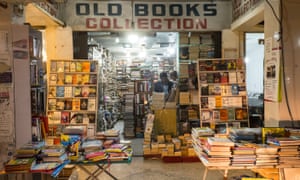Nadeem Ahmad Siddiqui is holding court with a group of friends and
regulars at his Islamabad bookshop, Jumbo. The jovial chatter and tea
drinking is broken up every so often by a customer seeking Siddiqui’s
help. One child is gently admonished to find something more stimulating
to read, while a question about medical textbooks from a mother and
daughter soon turns into an animated discussion about India-Pakistan
relations.
Tucked away in the corner of a busy commercial sector, unassuming
Jumbo Books has iconic status among Islamabad’s “old bookshops”, as
secondhand book stores are known here. Once the nondescript doorway is
located among the swanky new restaurants and fashion boutiques of
Pakistan’s capital, the visitor takes a staircase down to a concrete
basement. Inside are shelves piled high with rare antique books,
philosophical tomes and contemporary literature.
When Islamabad was built as the capital of a newly independent Pakistan,
it was the “old bookshops” that gave the neighbourhoods a spirit and
character beyond the insipid soullessness that pervades purpose-built
cities. ... [mehr] https://www.theguardian.com/cities/2018/mar/28/final-chapter-the-slow-death-of-islamabad-secondhand-bookshops

Keine Kommentare:
Kommentar veröffentlichen